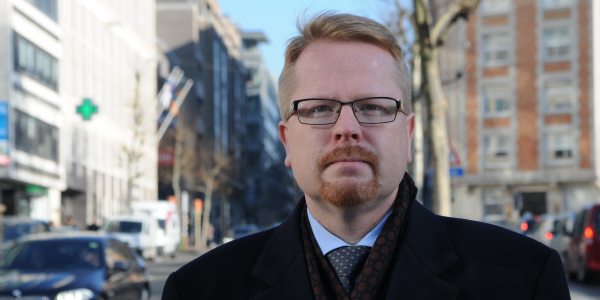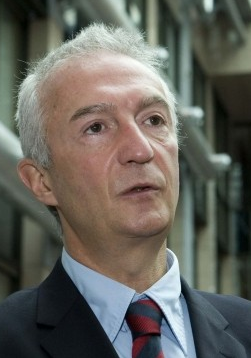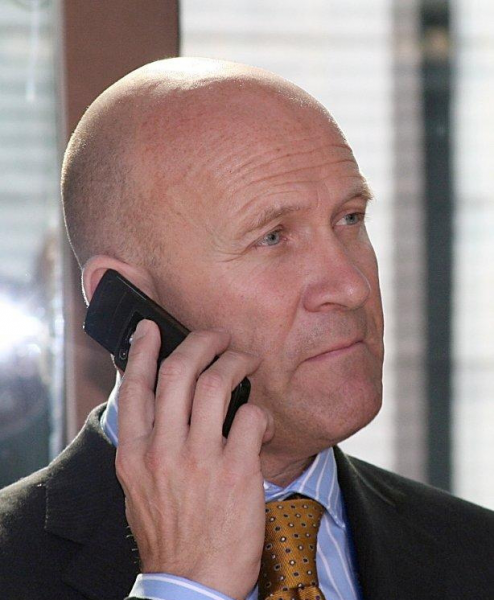
“To be clear: we are not operational intelligence. We have no interception capability, put no clandestine operations and keep any personal information to, “says Ilkka Salmi. For three years, the former CEO of the Finnish state security at the head of the INTCEN, where over thirty intelligence officers from EU Member States and as many officials and diplomats working.
“Our mission is strategic intelligence,” says Salmi. ”The secret services of the 28 EU Member States to send us on a voluntary basis by analysis reports – no raw intel . We put the puzzle pieces together and write it then reports to support the policy work of the European External Action Service. ”
And then there’s the Situation Room (SITROOM), staffed by 33 employees. Salmi: “They are a kind of European 911. They monitor permanently open sources such as the media and social networks. ”

Ilkka Salmi, director INTCEN
© Kristof Clerix
Military intelligence specialists
The intelligence directorate of the EU Military Staff has a similar command INTCEN. ”Our main mission is timely to identify which could pose a threat to the EU and to provide insight into regional developments for the EU are important. Understanding trends’ The words of Georgy Alafuzoff, former chief of the Finnish military intelligence (another Finn so) and since 2013 head of department of the Intelligence Directorate. ”We are the military intelligence specialists within the EU. Our approach is military, but we are working closely with the INTCEN. That military and civilian intelligence analysts work so closely, is quite unique. ”
“Naturally, our attention in the first place is given to
regions with challenges and problems confronting the EU interests: the
Horn of Africa, in view of our military operation in Somalia, Mali,
where a military operation is running and the Central African Republic
where the EU is active military in the future. “
Counterterrorism

Gilles de Kerchove,
EU counterterrorism czar
© RV
Ex-state security
Besides all this intelligence the European institutions also have an impressive security apparatus. Securing some 570 specialists in Brussels buildings, employees and classified documents of the Council, the Commission, the Parliament and the External Action Service. An additional task is to make all kinds of security threats-from bicycle theft to cyber attacks. Employees awareSecuring some 570 specialists in Brussels buildings, employees and classified documents of the EU.
Remarkably, the security directorates belated established. Really Although the Commission since the sixties has become a target for foreign secret services, its security became professionalized in the late eighties. Today, the department is headed by the Belgian Guido Vervaet, counterintelligence department is managed by compatriot Michel De Wolf, former State Security.
Council lap later in action in 2000 was Alex Legein also former State Security, the mission to build a major division of his security: counterintelligence. At the Parliament, which however gets 20,000 visitors per day on the floor, it is only since the beginning of 2014 there is a real safety directorate with attention to “risk” the Risk Analysis Unit has fifteen specialists. Reason is that parliamentarians also play a role recently in negotiating agreements requiring knowledge of classified information is required.
Potential targets of symbolic value
‘Lawyers, translators and specialists working with us a crypto policy around information security, “says Alexandro Legein. ”The vast majority of our people, veterans of the intelligence community, along with engineers and architects, however, are active in the physical protection of the Justus Lipsius building and the activities that take place here. The focus is on quarterly European summits, and special events, such as the African-European summit in April. Since taking ninety African state and government share. “To
Alexandro Legein, EU Security Council
© RV
A key focus for Legeins Directorate is the espionage threat, which is considered a cross-cutting risk to the organization. ”Everyone who works at the Council, at any position, is a potential target for organizations that are trying to get back sensitive information ‘, it sounds in the brochure Aware Today, Ready Tomorrow . In recent years, we also discussed various spy scandals to light.
What Legein troubling is the potential risk of social media. ”Hence the importance of awareness.Previously you had to speak with pliers yanking information from one European official. Today we are dealing with a generation of officers who share so much personal information on Facebook and the like, that it is very easy for talent spotters from hostile intelligence services. A mouse and a fake online identity sufficient to win the 3500 Council Officers, and then search for “pressure points” that make them vulnerable to espionage info. That to me is the greatest danger – except of course the interception capacity of countries like the U.S.. Who thought that the U.S. does not spy on us, was naive. If you can find water on Mars, you can hear someone eavesdropping. ”
Security Incidents
In 2013 by the 140The European External Action Service (EEAS), the diplomatic representation of the EU say – established after the Treaty of Lisbon in 2009. His security directorate, active since 2011, not only does the security of the building and the communication to the Schuman roundabout in Brussels, but also that of the 140 EU delegations around the world.
EU representations 188 security incidents reported.
“Here on the EEAS headquarters from 80 to 90 security officers, working a mix of diplomats, officials and persons with a security background,” says the Dutch diplomat Potuyt French, head of the security directorate. ”To the field we have 33 regional employees spread across the globe. They give safety advice to each a handful of delegations. ”

Headquarters of the European External Action Service in Brussels
Kristof Clerix
“It is our daily concern to analyze. All those incidents Recently, there was a boom in Yemen a linger explosive 140 meters from our delegation. Was that a fake bullet? It was intended for us or for the French Embassy 100 yards away? Or maybe the nearby home of former president was the target. We find out how far one has coined the EU. ”
Read a longer version of this article in the printed quarterly magazine MO * , edition March 2014.



No comments:
Post a Comment